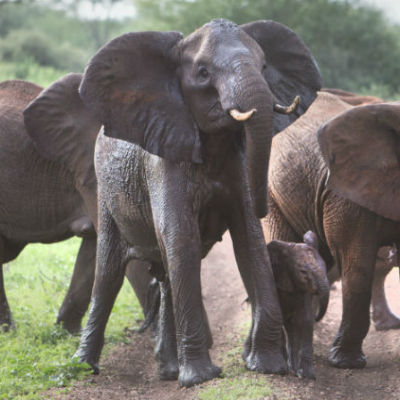Towards a worldwide ivory ban
TOWARDS A WORLDWIDE IVORY BAN
The UK is in the process of introducing a domestic ivory ban. But what action have other countries taken? Born Free’s Head of Policy Dr Mark Jones finds out
Upwards of 20,000 elephants are killed each year across Africa to supply illicit ivory markets. On average, at least 55 elephants are killed a day by poachers for their tusks. That’s about one every 25 minutes.
A ban on international trade in ‘new’ ivory was agreed under the UN Convention on International Trade in Endangered Species (CITES), when African elephants joined their Asian cousins on CITES Appendix I in 1989. Unfortunately, domestic markets have continued to thrive, fuelled by two CITES-approved ‘one-off sales’ of southern African ivory stockpiles to the Far East.
In recent years, the international community has come to recognise that the existence of legal domestic ivory markets stimulates demand, confounds enforcement efforts and facilitates laundering, thereby incentivising the illegal killing of elephants and undermining field conservation efforts. Ivory poaching and trafficking is largely coordinated by sophisticated criminal networks, whose activities undermine the rule of law and play a role in destabilising societies and economies, as well as devastating elephants and their populations.
At its World Conservation Congress in 2016, the International Union for the Conservation of Nature (IUCN) adopted a Resolution calling for the closure of domestic markets for elephant ivory. Soon after, CITES amended its own Resolution on Trade in Elephant Specimens to include a call for Parties to close domestic ivory markets that are contributing to poaching or illegal trade.
Domestic ivory trade is already banned in a number of African countries.
The USA took decisive action and banned imports, exports and domestic trade in most ivory products in 2016. Several of the country’s largest ivory markets including New York, Hawaii and California, have implemented even stronger bans on ivory sales.
China followed suit, by closing down its commercial ivory carving factories and outlets at the end of 2017.
Taiwan is poised to introduce among the most restrictive measures to end domestic ivory trade in January 2020.
Hong Kong has committed to phase out its domestic ivory markets by 2021, although efforts to expedite this process are ongoing.
The Australian Government is considering a recommendation by the Parliamentary Joint Committee on Law Enforcement for a ban on the domestic trade in elephant ivory and rhino horn.
More than 30 African states recently appealed to the European Union to close its ivory market to help protect elephants. The European Commission is currently considering the results of a public consultation from 2017, which generated almost 90,000 responses, the vast majority calling for a ban.

